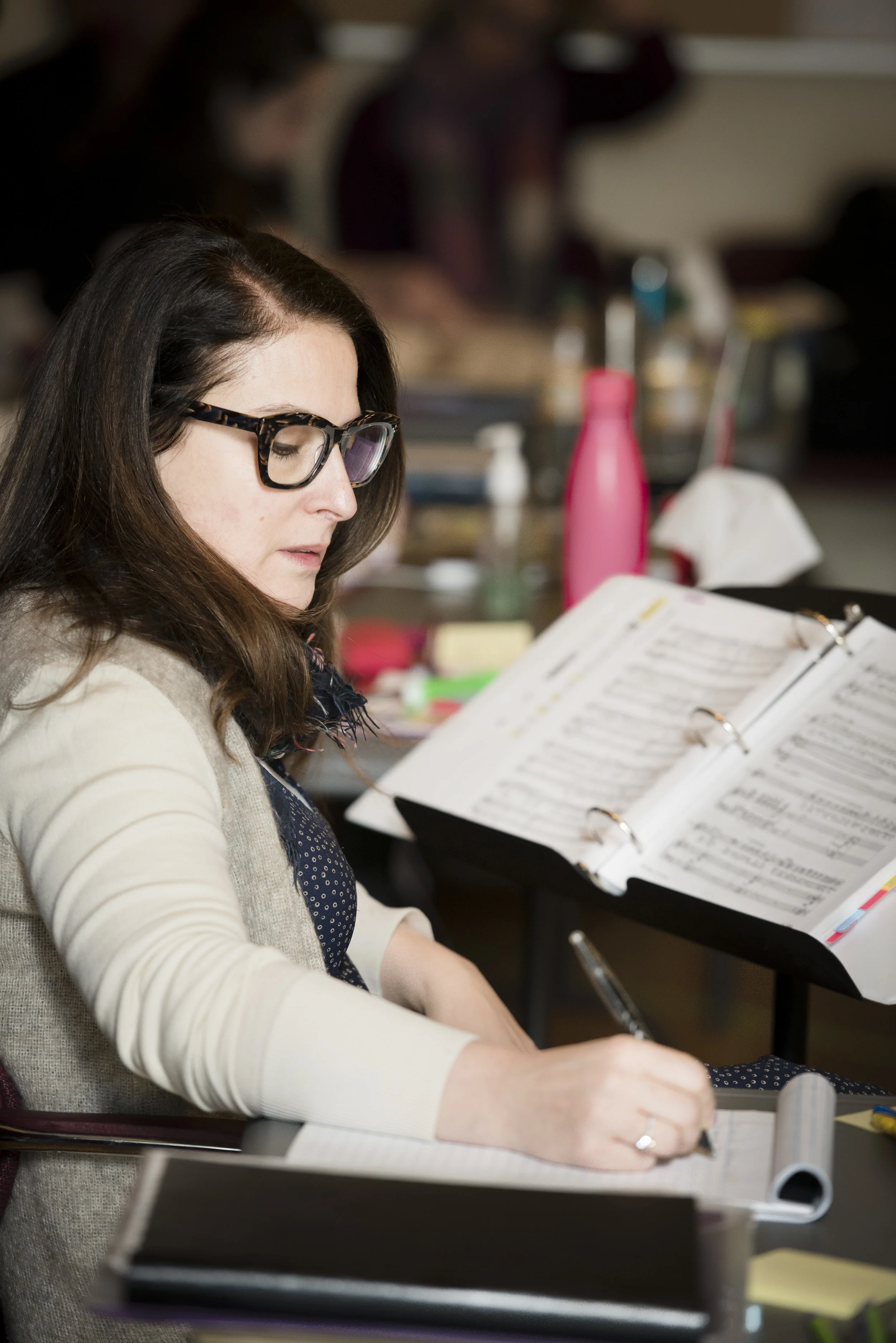Director Sarna Lapine takes notes at a Rape of Lucretia rehearsal. Liza Voll photograph
Benjamin Britten’s opera “The Rape of Lucretia” tells a story that makes you turn away in disgust.
Raped by the king’s son, Lucretia speaks out about the crime, to her husband and to the public. Then she commits suicide. These actions ultimately lead to the kingdom’s overthrow, and the changing of the ruling class. But the violence brought down on her, the sheer abuse of power, are only somewhat tempered.
Britten’s opera of the mythological Lucretia and her fate comes to Fort Point’s newly renovated Artists for Humanity Epicenter, opening March 11, staged by the Boston Lyric Opera. Sarna Lapine directs, and David Angus conducts. Soprano Kelly O’Connor sings the title role, baritone Duncan Rock is her attacker Tarquinius, and bass-baritone Brandon Cedel her husband Collatinus.
The brutal nature of the myth begs the question of whether the story should be revisited. Describing her initial reaction to the opera, Lapine says, “The sheer fact that this woman from a Greek folk tale has been capturing our imagination for 2500 years made me think, ‘Why are we so interested in the horrible things that happened to her?’
“My job as an artist, in conversation with any work, is to bring things to life,” she says, “to provoke a thoughtful conversation. Not to worry whether it’s easy to digest or not. Just because we don’t like what people do in stories doesn’t mean we should stop telling them.”
From a programming point of view, Esther Nelson, general and artistic director of the BLO, didn’t hesitate to schedule “Lucretia,” but knew additional resources would be beneficial. For the cast as well as the audience.
“We programmed the work two years ago, not even in the middle of the MeToo movement,” she says. “We all have sensitivities to the current climate, and the general attitude. We care about protecting our staff and families.
“But when you look at ‘The Rape of Lucretia,’ there are additional responsibilities,” Nelson says. “The title itself might be too raw, the work might cause hesitation. We talked about how things can trigger. How to lend assistance, to women or men.”
Partnerships with the Boston Area Rape Crisis Center and Casa Myrna were created to help staff and to anticipate audience reaction.
“We can’t put on this work in a vacuum,” Nelson says. “It’s likely that we have audience members who have experienced abuse. We know that. I think the question for us was ‘Why not?’ We want the experience to be authentic, but not scary.”
Artists are a part of audience as well, not only having to digest a story, but to interpret it in a genuine way. “A singer who has to be aggressor theatrically, or victim—how do they deal with it?” Nelson says. Yuri Yanovsky, former Boston Ballet principal, coaches the singers in “intimacy training,” as it’s professionally known—helping to bring challenging physical interactions believably to the stage.
Getting past the subject matter is one hurdle. Creating a relevant, engaging presentation that resonates with contemporary audiences is the second step.
“By the nature of reviving something, you’re already in a conversation with it from your particular position in time,” Lapine says. “We’re not condoning any behavior, and we’re not going to censor these stories. I am definitely not here to apologize for something that someone else wrote.”
Britten composed a number of works with Christian themes or subtexts, and “The Rape of Lucretia” is one. As the opera concludes, the male chorus sings about forgiveness.
“Unlike others who told the story, Britten added male and female chorus,” Nelson says. Individual singers—in this production, tenor Jesse Darden and soprano Antonia Tamer—sing as the chorus of men and women, respectively.
This climactic shading to the central story creates additional concerns. “The rest of the story is told with extremely clear eyes at events and their meaning,” Nelson says. “But then you have the Christian lens, actually the male dominated view of Christianity, saying it’s all about forgiveness. You want to look a the chorus and say, ‘Really?’ ”
For the director it’s about Lucretia—not just what happened to her.
“I am interested in bringing her to life,” Lapine says. “She’s enduring this experience, and it’s up to me to not leave that out. But also to show how it is shattering to her as a person, shattering her dignity and a sense of safety.”
Lucretia uses everything available to her as her tragedy unfolds. This production makes sure that being a victim is not all we think of when we consider her story.
“Lucretia’s response stirred a rebellion and overthrew the monarchy,” Lapine says. “She held him accountable. She laid herself at the feet of the people. It’s an incredibly resonant and timely story.”
The Boston Lyric Opera presents Benjamin Britten’s “The Rape of Lucretia” at the Artists for Humanity Epicenter, 100 West 2nd St., Fort Point, Boston, on Monday, March 11 through Sunday, March 17. For tickets and information visit www.blo.org or call 617 492-4912.


